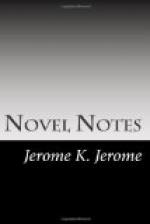* * * * *
My nurse sat for a while without speaking, a somewhat unusual thing for her to do.
“You ought to write your experiences,” I said.
“Ah!” she said, giving the fire a contemplative poke, “if you’d seen as much sorrow in the world as I have, you wouldn’t want to write a sad book.”
“I think,” she added, after a long pause, with the poker still in her hand, “it can only be the people who have never known suffering who can care to read of it. If I could write a book, I should write a merry book—a book that would make people laugh.”
CHAPTER IX
The discussion arose in this way. I had proposed a match between our villain and the daughter of the local chemist, a singularly noble and pure-minded girl, the humble but worthy friend of the heroine.
Brown had refused his consent on the ground of improbability. “What in thunder would induce him to marry her?” he asked.
“Love!” I replied; “love, that burns as brightly in the meanest villain’s breast as in the proud heart of the good young man.”
“Are you trying to be light and amusing,” returned Brown, severely, “or are you supposed to be discussing the matter seriously? What attraction could such a girl have for such a man as Reuben Neil?”
“Every attraction,” I retorted. “She is the exact moral contrast to himself. She is beautiful (if she’s not beautiful enough, we can touch her up a bit), and, when the father dies, there will be the shop.”
“Besides,” I added, “it will make the thing seem more natural if everybody wonders what on earth could have been the reason for their marrying each other.”
Brown wasted no further words on me, but turned to MacShaughnassy.
“Can you imagine our friend Reuben seized with a burning desire to marry Mary Holme?” he asked, with a smile.
“Of course I can,” said MacShaughnassy; “I can imagine anything, and believe anything of anybody. It is only in novels that people act reasonably and in accordance with what might be expected of them. I knew an old sea-captain who used to read the Young Ladies’ Journal in bed, and cry over it. I knew a bookmaker who always carried Browning’s poems about with him in his pocket to study in the train. I have known a Harley Street doctor to develop at forty-eight a sudden and overmastering passion for switchbacks, and to spend every hour he could spare from his practice at one or other of the exhibitions, having three-pen’orths one after the other. I have known a book-reviewer give oranges (not poisoned ones) to children. A man is not a character, he is a dozen characters, one of them prominent, the other eleven more or less undeveloped. I knew a man once, two of whose characters were of equal value, and the consequences were peculiar.”
We begged him to relate the case to us, and he did so.




